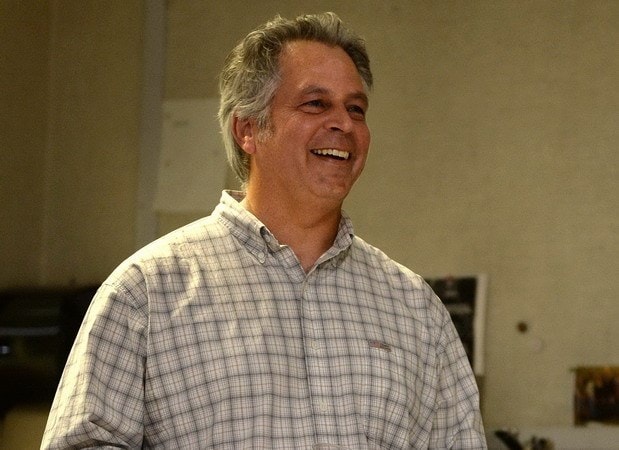The unknown about the Pulitzer Prize-winning journalist
Eric Eyre wasn't standing hopefully with his colleagues in the newsroom, ready with champagne from the grocery store, when the news broke that he had won the 2017 Pulitzer Prize for investigative reporting.
 |
| Eric Eyre at a late party to celebrate his award. (Source: Gazette-Mail) |
He wasn't even in the newsroom.
According to Poynter.org, Eyre, a government reporter working for the Gazette-Mail in Charleston, West Virginia, was standing next to the emergency exit in the hallway, ready to return to the Capitol.
After failing to win any awards in last week's annual Investigative Reporters and Editors competition for his investigation into the opioid crisis in West Virginia, Eyre realized he had no chance.
When his phone rang just after 3 p.m., it was Andrew Brown, a former colleague. Eyre thought, they must be finalists.
“He said, ‘No, you really won,’” Eyre recalled. “And I was like, ‘No way.’ I still can’t believe it.”
Eyre is the Gazette-Mail's first Pulitzer Prize winner. The Charleston Gazette, where he worked for 18 years, merged with the Charleston Daily Mail in 2015. The Daily Mail won its only Pulitzer for editorial writing in 1975.
When Eyre first came to the Gazette, it was a paper full of seasoned investigative reporters. He thought he would only be there for a year or two.
But he stayed. Despite his accolades, Eyre was not a project reporter and could not afford to spend months distracted from his main work.
Eyre is a national correspondent. He estimates he writes more than 250 articles a year and still covers police night shifts monthly. (He also notes that his 40-something colleagues at the newspaper write more and cover police night shifts weekly.)
Eyre's work is underpinned by the basics of journalism—he builds relationships with sources over time and strives to become an expert on particular topics while still writing about everyday stories.
These sources, combined with his knowledge of the pharmaceutical industry, helped him win the award, but the process took about three years of continuous reporting.
He also thinks about what he needs to cover on a daily basis and what can be held back for bigger stories.
“I don’t have two notebooks, but back in the day they used to say you had two notebooks, one in your back pocket and one you were holding,” Eyre shares.
Once he knew he had enough information for the project, Eyre put his editing duties on hold for a week to spend time writing his two-part series.
His planned one or two years at the paper turned into nearly two decades. But the Gazette-Mail, like many small local papers, has trouble keeping young journalists. Reporters eventually leave the paper or turn to him for career advice.
But his advice to them is to stick around, even if only for a while. It takes about a year to find the bigger stories. It's hard to run back and forth to find something that makes an impact.
“You have to work hard too,” he said.
That doesn't mean journalists should stay in a place where they feel uncomfortable. Everyone deserves to move on to bigger and better things. The Gazette-Mail is trying to combat attrition by pairing new reporters with veteran ones.
Now one of those veteran reporters is a Pulitzer Prize winner. And he finally gets to drink some champagne.
"We had to send someone to Kroger and they brought back two bottles of Korbel," Eyre said. "We didn't prepare anything. I didn't have a speech or anything. I just said a few words."
According to Vietnamplus
| RELATED NEWS |
|---|

